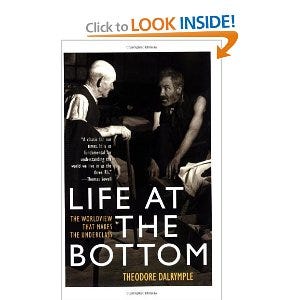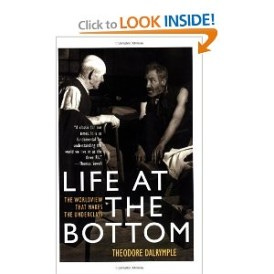How the Messianic Tendencies of the Government Promote the Suicidal Tendencies of the Poor


Theodore Dalrymple is the pen name of Anthony Daniels, an English medical doctor/psychiatrist and essayist. He is quite the essayist. First-rate if you ask me, and he has greatly informed and influenced my understanding of the plight of the poor under a socialist regime.
I have been reading his collection of essays entitled, “Life at the Bottom: The Worldview That Makes the Underclass.” The front cover bears a recommendation by Thomas Sowell which states, “A classic for our times. It is as fundamental for understanding the world we live in as the three R’s.” If I wrote a book that Thomas Sowell viewed as fundamental, I would say so on the front cover, too. Dr. Daniels is a physician in England, and has served in inner-city hospitals and prisons in London and Sub-Saharan Africa. Wikipedia reports that he interviewed over 10,000 people who had attempted suicide as research for this book. Needless to say it is a sad book. It is sad because it relates stories of hopelessness and despair, brought on by murder, rape, theft, domestic abuse, child neglect, drug addiction, and drunkenness, which are all proliferated by the government’s attempts to fix everything. It is also sad because Dalrymple’s penetrating analysis falls woefully short of producing an answer to the problems. These people are not only caught in the downward spiral of the government’s social commode, but they continue to make wicked personal choices, which are no one’s fault but their own. They need the Light that shines in the darkness if they are to find the pathway out of despair.
However, this is not to say that Dalrymple’s analysis of the situation is fatally flawed. He is a “scientist,” and has collected the “data” from his lifetime of interviewing. Though failing to correctly abstract the Biblical “universal” problem at hand, he has correctly diagnosed many of the symptoms. Through Dalrymple’s essays, I am becoming increasingly convinced that it is not only outside the God-ordained duties of the civil government to legislate and oversee the redistribution of wealth for the supposed betterment of the poor, but also that, despite the best of intentions, this perpetual “help” from the government becomes a detriment to their personal and social well-being. Dalrymple has correctly identified this detriment as a petrification of their state of squalor by the creation of a world view that holds them captive.
Dalrymple relates that there is squalor in England, but it is not economic. It is spiritual, moral, and cultural. The transformation of the lower class into the lower caste, from which there is rarely an opportunity to escape, has been caused by a social welfare system that has inasmuch removed any fear of the possibility of hunger. From the dawn of time men and women have been driven to work, beg, borrow, or steal for the purpose of getting enough calories in order to make it to the next meal. Even the poorest of people in non-socialized countries have a telos, a purpose. Their purpose is to survive the day, and that purpose brings a certain amount of satisfaction when they accomplish it. Dalrymple’s essays remind us that without the chance of starvation, the poorest of society have their sole purpose removed. Instead of it being replaced by something profitable, they are left with boredom, which will eventually lead to crime, gluttony, drunkenness, illicit sexuality, and eventually despair. This kind of life destroys any real self-esteem, and “with no self-esteem, there is no chance of self-improvement.” This purposeless life leads many to regret being alive at all.
“That’s easy for a middle-class guy in America to say,” you might be thinking to yourself, “telling people to find their purpose and satisfaction in surviving the day.” Yeah, it does come across as harsh, but the reality of the matter, one that many refuse to accept is that you cannot legislate away poverty and you cannot ultimately sidestep your Creator. If He has created you in His image, and He has, then certain rules apply. Not just rules like the “thou shalt nots,” but the underlying fabric from which all of the positive laws spring. The two realities that God is, and God made us in His image.
There is a Messiah, who will set the world to rights. He delights in feeding the poor. In healing up the broken-hearted. In bringing joy to those who despair. In setting the prisoner free. In giving purpose to the hopeless. His name is Jesus, and next post, I will examine Dalrymple’s conclusions in the light of His Word.
Here’s a link to purchase this important work on Amazon:
Life at the Bottom, by Theodore Dalrymple
If you’re a Kindle person, you can get the book for cheap!
<>изготовление ов в москвекак быстро раскрутить свой
The post How the Messianic Tendencies of the Government Promote the Suicidal Tendencies of the Poor appeared first on Kuyperian Commentary.

